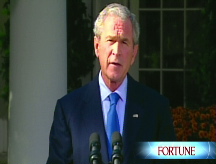Obama: 5 new ideas for crisis
Democratic nominee augments his economic agenda with some new proposals and a nod to one from his rival.
NEW YORK (CNNMoney.com) -- Both presidential candidates have gotten flack for not being more specific about just what they would do to help ease the financial crisis.
Perhaps seeking to remedy that, both candidates are putting out new proposals this week ahead of their third and last debate.
Democratic nominee Barack Obama went first on Monday. He put forth a host of new ideas and signed on to one proposed last week by his rival, John McCain.
Obama has proposed letting workers who are having a hard time paying bills make penalty-free early withdrawals from their IRAs and 401(k)s in 2008 and 2009. One could withdraw up to 15% of one's balance but not more than $10,000. Normally such withdrawals made before age 59-1/2 are taxed as income and are subject to a 10% penalty rate. The provision would apply retroactively to Jan. 1, 2008.
For people who already made or are planning to make hardship withdrawals, this would be a welcome form of relief. But it may encourage people to make withdrawals that they otherwise would not have - perhaps because they can't stomach the volatility in the markets. And that may unnecessarily hurt their retirement savings long-term and potentially boost federal tax coffers, since the withdrawals would still be subject to income tax, said Mark Luscombe, principal federal tax analyst for tax information publisher CCH.
Obama said he agrees with the proposal Republican nominee McCain made last week to temporarily excuse retirees from having to cash out a percentage of their IRAs or 401(k)s when they turn 70-1/2.
Since the minimum required amount to be withdrawn in a given year is based on one's account balance at the end of the prior year, it can be a much bigger hit to seniors' nest eggs when they have to make their withdrawal after the market has fallen precipitously. On Monday, the Dow was down 29% from where it was on Dec. 31, 2007.
Obama wants to help counter the budget crunch faced by states, whose tax receipts are declining while demand for and cost of public services is rising.
But given all of the other - in some cases unlimited - commitments the Fed and Treasury have already made to foreign central banks and domestic banks in the course of this bailout, is it really something they can afford to do at the local level as well? Since the Fed can print money, it in theory can afford anything, but it's not clear what the long-term inflationary effects would be.
Obama wants to offer a temporary tax credit of $3,000 in 2009 and 2010 to companies for each new full-time employee it hires in the United States.
"I'd guess that it would be of limited effect since the cost to the company [of making a new hire] is still great," Luscomb said.
Similar credits exist to encourage employers to hire disabled workers. It's been a meaningful incentive to the extent an employer was going to hire someone anyway. But in and of itself it has not served as an incentive to create new positions, he noted.
What the Obama-proposed credit might do, Luscomb said, is narrow the difference in the cost of hiring a domestic worker versus a worker from abroad.
Obama, like most Democrats calling for a second economic stimulus package, wants a 13-week extension of unemployment benefits to help those who may be unemployed for more than six months.
The newer element is his call for the suspension of income taxes on those benefits, a move that would leave more money in jobless workers' pockets. In turn, that could help them make their mortgage payments or continue to spend money at businesses in their community.
The tax suspension, however, could hit federal coffers harder than usual, since Uncle Sam already sees fewer tax receipts from unemployed workers.
Obama said he wants to require any financial institution that participates in Treasury's Troubled Asset Relief Program for financial institutions to put a 90-day moratorium on foreclosures for homeowners "acting in good faith." The moratorium, according to the Obama campaign, would offer a time-out to give the lender and homeowner more time to work out an agreement that could keep the homeowner in his home.
The campaign didn't specify how "acting in good faith" is defined. And it's not clear how onerous a provision this would be for financial institutions that are considering participating in the TARP.
One of Treasury Secretary Henry Paulson's concerns when legislators were debating the rescue package was that too many restrictions might discourage companies from participating at all. ![]()





